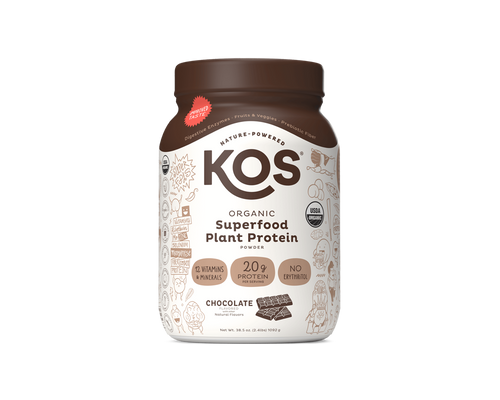Table of Contents
What Are the Dangers of Erythritol You Need to Know About
Recent news concerning the erythritol sweetener is making headlines due to its potential link with serious heart health issues. But what exactly is erythritol, and how does it work? Are there any good brands on the market offering protein powder without erythritol to stay safe while still having a delicious snack or meal?
Keep on reading to discover if erythritol is bad for you, alongside all the facts about this controversial ingredient, to make better choices for yourself and those you care about.
What Is Erythritol?
Erythritol is a type of sugar alcohol that has been used as an artificial sweetener in many processed foods and beverages. Additionally, it has become a popular ingredient in protein powders and other nutritional supplements.
It contains 0.24 calories per gram and is created when a type of yeast ferments glucose from corn or wheat starch. The final product looks like white crystal granules or powder.
Other sugar alcohols include sorbitol, lactitol, isomalt, maltitol, mannitol, glycerol/glycerin, and xylitol.
What Are Erythritol Sweetener Dangers?
A recent study in Nature Medicine found that this sugar alcohol may put individuals at risk for serious heart-related health issues - prompting many to avoid supplement products containing this potentially dangerous additive.
Here are just some of the dangers erythritol poses:
Gastrointestinal Problems - Some potential dangers of consuming erythritol suggest that it may negatively impact the gut microbiome. That one includes stomach cramps, gas, bloating, and even loose stool if consumed in large amounts.
Allergic Reactions - Additionally, there have been reports of allergic reactions to products containing this sweetener, so sensitive people should be careful when consuming it.
Hormonal Problems and Abdominal Pain - Lastly, many believe this sweetener could potentially disrupt hormones or cause other health issues over time.
What Are Erythritol Side Effects?
From a slight tummy ache to full-on gastrointestinal distress, the amount of this particular substance you consume is essential in how severely its side effects can hit.
To maintain optimal health, adults should limit their consumption of erythritol to approximately 0.45 grams per pound of body weight or 1 gram per kilogram of body weight. Exceeding this could lead to those undesired side effects.
Also, sugar alcohols like this one have an undesired laxative effect that leads to additional discomfort by drawing water into the intestines, often resulting in excessive nausea and headaches due to dehydration.
Overeating is ironically one of this substance's weirdest ill effects – since erythritol isn’t digested at all - leading you astray with false messages of hunger!
What Are the Long-Term Effects of Erythritol?
Did you know that the body actually can’t break erythritol down? That’s right — studies show that even though erythritol travels through your body, it doesn’t get metabolized.
That's because your small intestine absorbs it quickly and gets it out of your body within 24 hours through urine.
But, for people with sensitive stomachs, beware: prolonged consumption of this sugar alcohol may lead to long-term gastrointestinal distress such as persistent heartburn, irritable bowel syndrome, or indigestion. These issues may become chronic depending on your constitution and overall lifestyle.

Is Erythritol the Same as Stevia?
Wondering if erythritol is the same as stevia? It's not! While both fall under Non-Nutritive Sweeteners (NNS), erythritol is an alcohol created through the fermentation of sugars, whereas Stevia derives from the leaves of a shrub called Stevia rebaudiana.
With the recent findings on the potential health effects of erythritol, you may want to consider switching to options like stevia and monk fruit. These health-promoting sweeteners offer a range of benefits and can be used in various foods, beverages, and supplements (like protein powders) to help reduce your intake of artificial sweeteners and their potential side effects.
Does KOS Make Products Without Organic Erythritol?
One of the reasons that KOS has become so popular among health-conscious consumers is that they prioritize transparency and sustainability in their product formulations.
So the short answer is - Yes!
KOS is one of the leading brands that offer products without organic erythritol.
In particular, KOS is known for offering a range of vegan-friendly protein powders that are made with all-natural ingredients. These protein powders are designed to provide a convenient and delicious source of plant-based protein without relying on artificial sweeteners like erythritol. Instead, KOS uses ingredients like organic stevia leaf extract and monk fruit extract to add natural sweetness to their products.
Overall, KOS is a great option for anyone looking for natural, plant-based supplements that are free from harmful sugar alcohol.
Whether you are looking for a protein powder, superfood blend, or another dietary supplement, KOS offers a wide range of options to choose from, all of which are made with your health and wellness in mind - and that means an erythritol-free zone!
Conclusion
While those looking for smart alternatives to sugar may have thought erythritol was a health choice, the newest study reveals there could be unexpected, heart-related consequences.
From digestive issues and bacteria growth in the oral cavity to impacting your gut microbiome, consuming this artificial sweetener can cause harm instead of good.
To ensure you don't fall victim to these risks, read food labels whenever shopping at the grocery store or try KOS' vegan products that contain nutritious protein without any unwanted side effects!

FAQs
What Are Erythritol Sweetener Dangers?
Erythritol, an artificial sweetener, may come with some unpleasant side effects. Not only can consuming too much lead to digestive issues such as stomach cramps and bloating but there have also been reports of allergic reactions. Furthermore, experts are concerned that it could do long-term damage by interfering with hormones or causing other heart-related health concerns.
What Are Erythritol Side Effects?
Consuming too much erythritol can lead to a range of unpleasant side effects, from mild discomfort to intense gastrointestinal distress. Not only that, but excess consumption leads to an unfortunate laxative effect causing further nausea and headaches due in part to dehydration. Ironically you may even experience false signals of hunger as the erythritol isn't digested at all!
What Are the Long-term Effects of Erythritol?
Chronically consuming this sugar alcohol could disrupt your digestive health and leave you dealing with long-term issues such as heartburn, irritable bowel syndrome, or indigestion.
Does KOS Make Products Without Organic Erythritol?
KOS has quickly become a household name among healthy shoppers thanks to its commitment to providing clean, safe products. Not only do they practice transparency and sustainability in product formulation, but all of the offerings are also free from organic erythritol! Put simply – look no further than KOS regarding health-conscious choices with peace of mind included.




